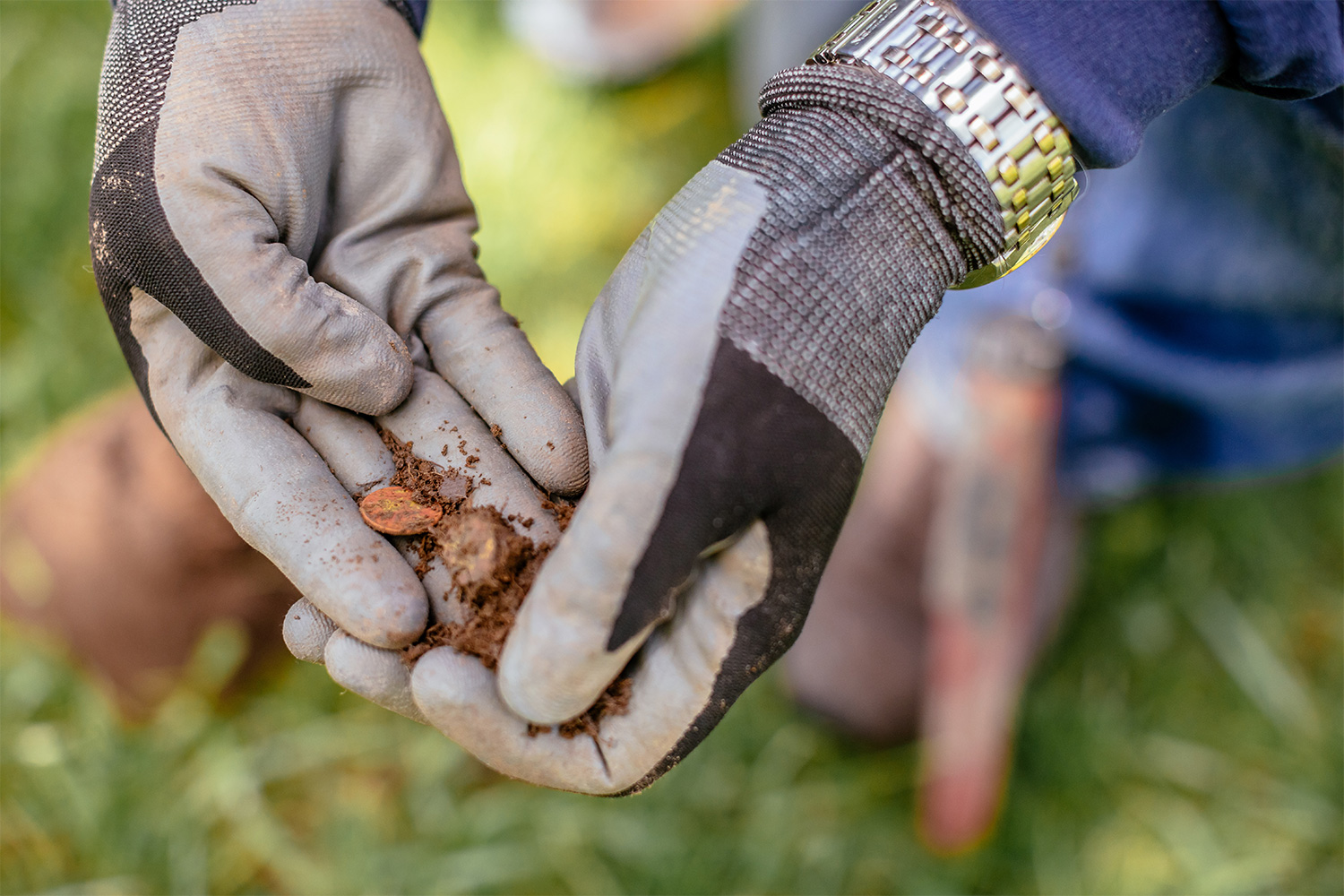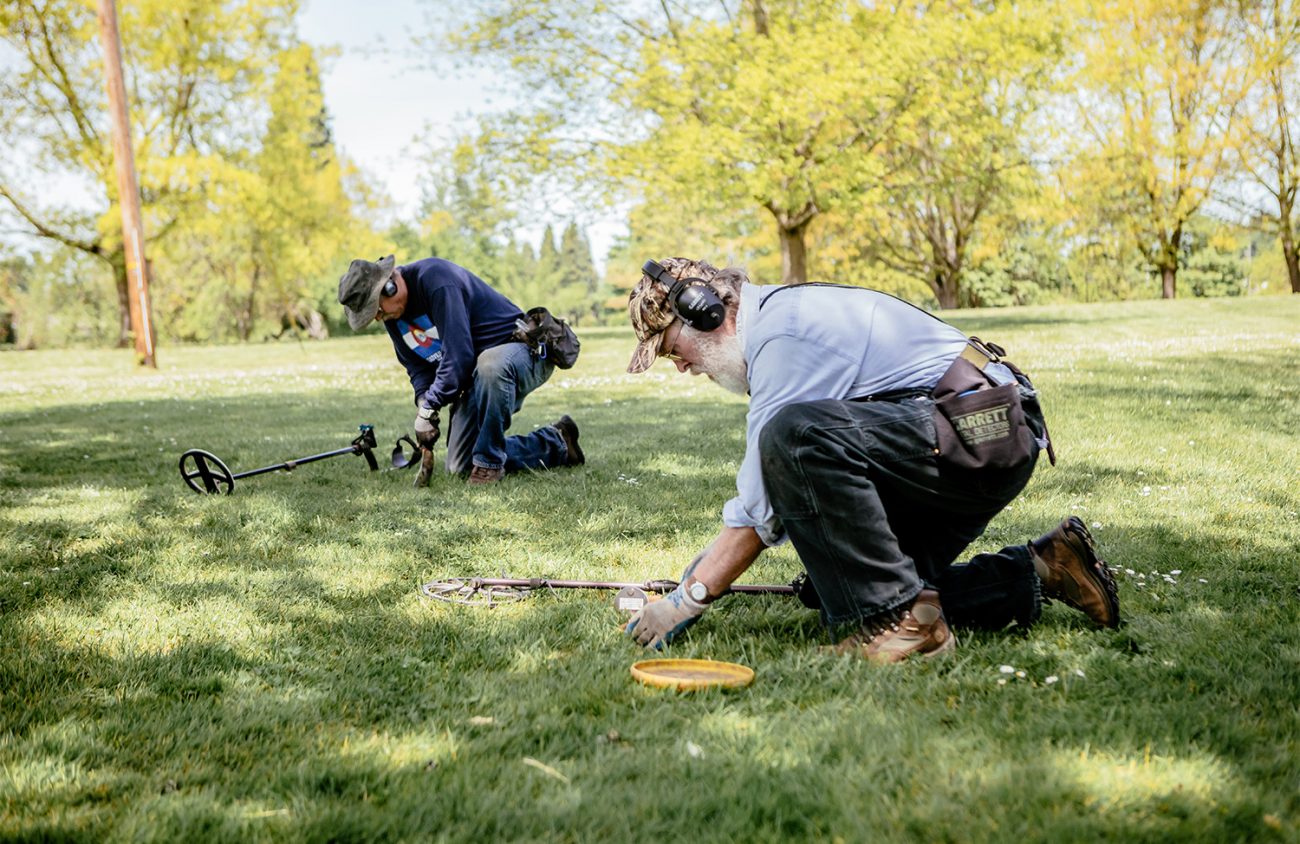It’s a warm spring day at Alton Baker Park. Trees are blossoming and a small breeze drifts through an empty field of grass. But local metal detectors Stuart Pritchard and Larry Orr are not interested in what’s happening above ground, because the potential for hidden treasures lies under the dirt.
Called the Coil and Diggers Club of Lane County (CDCLC), its members spend their spare time on afternoons and weekends metal detecting. They help people find lost rings and family heirlooms, and they visit parks for their own chance at finding something — whether it be a bottle cap, a gold ring, vintage coins or a pop can tab.
I meet Pritchard and Orr, the club president, at Alton Baker so they can show me the ropes of metal detecting. When Pritchard shows up, he’s in full gear: a tool belt equipped with a trowel, a smaller metal detecting wand, gloves, knee pads and, of course, his metal detector. He explains that, usually, detectors wear headphones, too, to keep the beeping to themselves and not disturb other park goers.
The CDCLC was started in 2006 by Barbara Tyler, who is still a member. Orr says women and men of all ages are involved, and there are currently between 50 and 60 members. Both Pritchard and Orr are retired.
The club has taken a hiatus during the COVID-19 pandemic, but in normal times they meet about once a month and also schedule outings where they can go and detect together. Sometimes they have little contests, like who can find the most of one item, or they get commissioned to help people find valuables. The club also has yearly camping trips. Orr says he hopes they can resume outings next month.
Meanwhile, Pritchard walks through grass and swings the metal detector back and forth in an even motion, like a pendulum. The detector beeps to signal whether or not it senses an item underground. After a few minutes of methodical looking, the metal detector gives off a steady sound, and Pritchard homes in on it. He kneels down and uses the small detector wand to confirm the exact spot.
Pritchard unsheathes his trowel. “We don’t dig a hole all the way around,” he explains. “It’s horseshoe shaped, which is better for the roots.” Then, he digs the hole as he described and lifts up a small patch of earth. The anticipation between the three of us was tangible.
After a few seconds of poking around, Pritchard pulls out his hand, revealing something small and silver.
“Pull tab,” he says. Orr adds that anytime they find a bottle cap, pull tab or some type of tin foil, they always pick it up and either recycle it or throw it away.
Though finding pull tabs can be anticlimactic, Pritchard and Orr agree that the best part of metal detecting is never knowing what you may find.
“It’s like playing a slot machine without a quarter. You never know what you will get,” Pritchard says.
Enlarge

Photo by Todd Cooper
To metal detect in Oregon, you need a permit from the state and county you are detecting in. Orr says this is because there are rules on where you can metal detect in public. For example, National Parks are off limits. They often get commissioned to visit people’s private property to recover lost items — from heirlooms to engagement rings. Orr says if they are able to find the missing items, the reactions are generally pretty emotional.
“We found a 50-year anniversary ring for someone recently,” Orr recalls.
And they don’t charge anyone to go out and search. The CDCLC website has an entire photo album of individuals who had their valuables returned.
If club members happen to come across valuable items while searching in public areas, Pritchard says they try to return them to the owner, but the return often ends up being unsuccessful.
Returning items found at the beach is even more difficult, he adds, laughing. “Because you never know if they lost the ring or threw it.” Both Pritchard and Orr have their own unique collection of items found, which include silver rings, wheat pennies, buffalo nickels and Civil War memorabilia.
Once again, Pritchard’s metal detector swings grow shorter. He stops at the patch of grass where he thinks the item is and the smaller detector confirms it. A moment later, he pulls out a long, thin piece of metal.
“Looks like a flattened bottle cap,” he says and drops it into a container in his tool belt. Pritchard may be zero for two in discovering unique items this afternoon, but if he’s disappointed he doesn’t let it show.
He says he and his wife will often come out to a park just to see who can find a dollar in coins first. Since he first started metal detecting in 1984, Pritchard has traveled around the world to find things. In London, he found a 2,000-year-old Celtic coin.
Pritchard continues to sweep the field, finally finding another spot with something hidden under the earth. He repeats his usual process with ease: confirming the location, digging the horse shoe-shaped hole, verifying the location in the hole, then finding what’s inside.
This time, when Pritchard removes his hand from the ground, he motions for me to open my hand. I do, and he plops a quarter into it. Both Pritchard and Orr smile at me.
“There,” Pritchard says. “Now you can say you’ve found something metal detecting.”
The quarter is from 2013. It’s not old or worth more than its original 25 cents, but it is enough to instill a desire to come back and search for more. As it turns out with metal detecting, all that glitters is not gold, but it might be a quarter, and that’s pretty cool, too.
If you want to commission the Coil and Diggers Club of Lane County to find a lost item, email them at CDCLC@msn.com. For more information on the club visit CDCLC.org.
